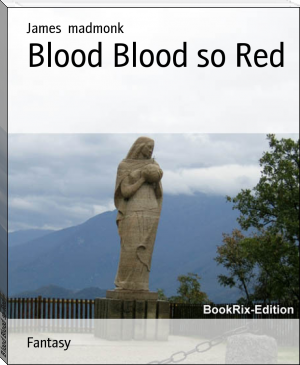Robin Hood by J. Walker McSpadden (best book series to read txt) 📗

- Author: J. Walker McSpadden
Book online «Robin Hood by J. Walker McSpadden (best book series to read txt) 📗». Author J. Walker McSpadden
So Robin walked forth into the wood that evening with his stomach full and his heart, therefore, in great contentment and love for other men. He did not stop the first passer-by, as his manner often was, and desire a fight. Instead, he stepped behind a tree, when he heard a man’s voice in song, and waited to behold the singer. Perhaps he remembered, also, the merry chanting of Will Scarlet, and how he had tried to give it pause a few days before.
Like Will, this fellow was clad in scarlet, though he did not look quite as fine a gentleman. Nathless, he was a sturdy yeoman of honest face and a voice far sweeter than Will’s. He seemed to be a strolling minstrel, for he bore a harp in his hand, which he thrummed, while his lusty tenor voice rang out with—
“Hey down, and a down, and a down! I’ve a lassie back i’ the town; Come day, come night, Come dark or light, She will wed me, back i’ the town!”Robin let the singer pass, caroling on his way.
“‘Tis not in me to disturb a light-hearted lover, this night,” he muttered, a memory of Marian coming back to him. “Pray heaven she may be true to him and the wedding be a gay one ‘back i’ the town!”’
So Robin went back to his camp, where he told of the minstrel.
“If any of ye set on him after this,” quoth he in ending, “bring him to me, for I would have speech with him.”
The very next day his wish was gratified. Little John and Much the miller’s son were out together on a foraging expedition when they espied the same young man; at least, they thought it must be he, for he was clad in scarlet and carried a harp in his hand. But now he came drooping along the way; his scarlet was all in tatters; and at every step he fetched a sigh, “Alack and a well-a-day!”
Then stepped forth Little John and Much the miller’s son.
“Ho! do not wet the earth with your weeping,” said Little John, “else we shall all have lumbago.”
No sooner did the young man catch sight of them than he bent his bow, and held an arrow back to his ear.
“Stand off! stand off!” he said; “what is your will with me?”
“Put by your weapon,” said Much, “we will not harm you. But you must come before our master straight, under yon greenwood tree.”
So the minstrel put by his bow and suffered himself to be led before Robin Hood.
“How now!” quoth Robin, when he beheld his sorry countenance, “are you not he whom I heard no longer ago than yesternight caroling so blithely about ‘a lassie back i’ the town’?”
“The same in body, good sir,” replied the other sadly; “but my spirit is grievously changed.”
“Tell me your tale,” said Robin courteously. “Belike I can help you.”
“That can no man on earth, I fear,” said the stranger; “nathless, I’ll tell you the tale. Yesterday I stood pledged to a maid, and thought soon to wed her. But she has been taken from me and is to become an old knight’s bride this very day; and as for me, I care not what ending comes to my days, or how soon, without her.”
“Marry, come up!” said Robin; “how got the old knight so sudden vantage?”
“Look you, worship, ‘tis this way. The Normans overrun us, and are in such great favor that none may say them nay. This old returned Crusader coveted the land whereon my lady dwells. The estate is not large, but all in her own right; whereupon her brother says she shall wed a title, and he and the old knight have fixed it up for to-day.”
“Nay, but surely—” began Robin.
“Hear me out, worship,” said the other. “Belike you think me a sorry dog not to make fight of this. But the old knight, look you, is not come-at-able. I threw one of his varlets into a thorn hedge, and another into a water-butt, and a third landed head-first into a ditch. But I couldn’t do any fighting at all.”
“‘Tis a pity!” quoth Little John gravely. He had been sitting cross-legged listening to this tale of woe. “What think you, Friar Tuck, doth not a bit of fighting ease a man’s mind?”
“Blood-letting is ofttimes recommended of the leeches,” replied Tuck.
“Does the maid love you?” asked Robin Hood.
“By our troth, she loved me right well,” said the minstrel. “I have a little ring of hers by me which I have kept for seven long years.”
“What is your name?” then said Robin Hood.
“By the faith of my body,” replied the young man, “my name is Allan-a-Dale.”
“What will you give me, Allan-a-Dale,” said Robin Hood, “in ready gold or fee, to help you to your true love again, and deliver her back unto you?”
“I have no money, save only five shillings,” quoth Allan; “but—are you not Robin Hood?”
Robin nodded.
“Then you, if any one, can aid me!” said Allan-a-Dale eagerly. “And if you give me back my love, I swear upon the Book that I will be your true servant forever after.”
“Where is this wedding to take place, and when?” asked Robin.
“At Plympton Church, scarce five miles from here; and at three o’ the afternoon.”
“Then to Plympton we will go!” cried Robin suddenly springing into action; and he gave out orders like a general: “Will Stutely, do you have four-and-twenty good men over against Plympton Church ‘gainst three o’ the afternoon. Much, good fellow, do you cook up some porridge for this youth, for he must have a good round stomach—aye, and a better gear! Will Scarlet, you will see to decking him out bravely for the nonce. And Friar Tuck, hold yourself in readiness, good book in hand, at the church. Mayhap you had best go ahead of us all.”
The fat Bishop of Hereford was full of pomp and importance that day at Plympton Church. He was to celebrate the marriage of an old knight—a returned Crusader—and a landed young woman; and all the gentry thereabout were to grace the occasion with their presence. The church itself was gaily festooned with flowers for the ceremony, while out in the church-yard at one side brown ale flowed freely for all the servitors.
Already were the guests beginning to assemble, when the Bishop, back in the vestry, saw a minstrel clad in green walk up boldly to the door and peer within. It was Robin Hood, who had borrowed Allan’s be-ribboned harp for the time.
“Now who are you, fellow?” quoth





Comments (0)